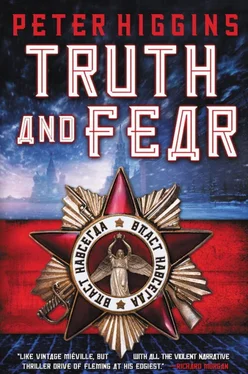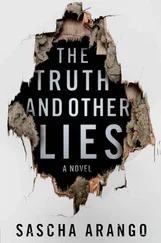Lom went up behind her. He could smell the soap and the warmth of her skin and hair. Her hands, her face, her neck were flushed from the icy cold of the water. He could smell the scent of her on the thin blouse she’d been wearing the day the boat took them into the White Reaches and was still wearing now. He could still feel the warmth of her long back against his side, where she had lain pressed against him in the bed in the gate keeper’s lodge the night before. Twenty-four hours ago. He picked up the towel and dipped a corner of it in the icy water in the pitcher. Began to wipe the soap from her neck and her arms.
When he took her two hands in one of his and drew them gently away from her face, her eyes were screwed tight shut. He wiped the soap from them, one by one. She turned into his arms, opened her eyes and looked into his. Held his gaze for a long, quiet time. There was a faint sweetness of brandy on her breath.
She was a stranger to him. Again, he felt the otherness of her. A part of her was very far away, behind her eyes, not wanting to be reached.
He moved the rough damp edge of the towel across her mouth, wiping the soap away. She moved her body against him. He felt the patch of damp cold where she had spilled water down her neck. She opened her mouth and put her lips against his.
Hours later, Lom lay wakeful in the dark, listening to the quiet creaks and ticks of the roof beams under the accumulating weight of snow. Maroussia was lying next to him, sleeping, the warmth of her breathing against his cheek. He listened to the rattles and groans in the pipes, the scratch and skitter of small animals. Felt the presence of dark, amorphous, inky, shifty, scuttling night-things that lived in the shadows and ceilings and whispered. Cool, filmy presences. Watchful creatures of fur and dust. The delicate new skin across the hole in the front of his skull fluttered in response with gentle moth-wing beats.
Slowly and carefully so as not to wake her, he slipped out from under the quilt and padded barefoot across to the window. It was bitterly cold in the room. He was instantly shivering. The vapour of his and Maroussia’s breath had crystallised in whorls and ferns of frost across the windowpanes, and through it a faint snow-glimmer filtered into the room. He cleared a patch with the side of his palm and looked out: dense, swirling snowfall still coming down; the tumbled, tightly packed rooftops of the raion falling away down the hill. Lamps burning in a few isolated windows, their light reflecting off the snow.
Lom used to think, once, that snow was frozen rain, that snowflakes were raindrops that turned to ice as they fell through freezing air. But then, he’d forgotten where, he discovered the truth. Snow wasn’t frozen rain, it had never been rain. Snow was the invisible vapour of water–the slow and distant breath of lakes, of rivers, of oceans–crystallising suddenly out of thin air. A billion billion tiny weightless dagger-spiked ghosts, materialising. From the first time Lom heard this, the thought had electrified him: he’d realised that all around him, all the time, all the year, always, there existed in the air, unseen, the latent possibility of snow. Even the warmest summer day was haunted by snow. The memory of how to be snow. All that was required to make it real was cold. And when the cold moment came, snow manifested itself suddenly out of the air in a kind of chill ignition, the opposite of flame.
Somewhere in the city was a man who had worn his face. A man who pulled bullets out of his belly and walked away. And Chazia was out there too. And so was Josef Kantor.
‘Vissarion?’ said Maroussia. Her voice was quiet in the dark.
‘Yes? I thought you were asleep.’
‘No.’
‘Are you OK?’
‘Yes. Only… I was thinking.’
‘What?’
‘Do you think Elena’s right? Do you think we should get out of Mirgorod? Do you think we should run?’
‘Do you?’ he said across the dim snow-shadowed room.
‘No.’
‘Then don’t. Don’t run.’
‘But… I don’t know what to do,’ she said. ‘I mean, say we could get into the Lodka and find it, find the Pollandore… All I’ve got is fragments. Garbled messages. It’s not enough.’
‘So what do you want to do?’
‘I don’t know,’ she said. ‘I need more. I need the forest to talk to me again.’
‘OK,’ said Lom.
‘OK what?’
‘OK, so talk to the forest again.’
‘Do you know how to do that?’ said Maroussia.
‘No.’
She said no more, but Lom could hear her breathing. Lying awake in the dark.
She was taking the righting of the world on her shoulders. The weight of it, the pressure and hopelessness of what she was choosing, squatted heavily in the room. He went across to the bed and got in. Pulled the quilt up around them both. Made a warm dark private place, simple and human, like people’s lives should be. Just for now.
Lavrentina Chazia had never believed that she knew every room in the Lodka. No one could. The route Dukhonin led her, shuffling slowly in his carpet slippers, his left arm stiff and useless, his thin bony face sticky with drying blood from his ruined eye, was new to her. They climbed stairs and took lifts, ascending and descending, until she had no idea where in the building they were, or even whether they were above or below ground. They passed no one.
‘Here,’ said Dukhonin, stopping at a heavy anonymous door with a combination lock. ‘This is the place.’
He fumbled with the tumbler. His hand was trembling. He pulled at the door but it didn’t shift.
‘Shit,’ he muttered. ‘Shit.’
He started again. Chazia pushed him aside.
‘I’ll do it,’ she said. ‘Tell me the numbers.’
He did.
Beyond the door were more corridors, deserted in the early hours. Bez Nichevoi followed a few paces behind them. Silently in his soft leather shoes. They passed rooms that showed signs of current occupation. Handwritten notices: ESTABLISHMENTS; ACCOUNTS; TRANSIT; PROCUREMENT AND SUPPLY . Telephone cables trailing across the floor. Green steel cabinets. A telegraphic printing machine–a contraption of brass and cogs with a board of black and white keys like a piano, the kind that printed out endless spools of paper tape–stood inactive on a heavy wooden table. There was a basket to catch the tape as it passed out, but it was empty. This was a significant operation. Dukhonin set it all up and kept it running without even a whisper reaching her? But it was all support functions. Generic. The substance was elsewhere.
Dukhonin brought them to a small windowless room. The card beside the door said PROJECT WINTER SKIES . Inside were eight chairs set round a plain meeting table and on the wall was a map showing the rail and river routes of the north-eastern oblasts: wide expanses of nothing but a patchwork of small lakes and emptiness, railheads and river staging posts, the coast of the Yarmskoye Sea; and beyond that the irregular fringe of permanent ice, and blankness.
At one end of the room was a small projection screen, and at the opposite end a Yubkin film projector on a sturdy tripod.
‘Sit, Lavrentina,’ said Dukhonin. ‘Please. Sit.’ He looked at Bez. ‘Is he… staying? This is… What you’re going to see is… I would not recommend that he remains.’
‘He stays.’
‘Lavrentina. Please. Nothing is more sensitive than this. And… and I will need to extinguish the lights.’
‘He stays.’
Dukhonin, his breathing loud and ragged, unclipped the twin reel covers and checked the film spool was in place. One-handed and trembling, it took him a long time. At last he got the projection lamp lit and set the cooling fan running. He brought up a test image and spent some time selecting a lens and adjusting the focus. There was a heavy radiator blasting heat into the cramped stuffy room. Chazia smelled Dukhonin’s stale sweat. The sourness of his fear. The piss on his trousers. She shifted in her seat and scratched in irritation at the angel stains on her arms.
Читать дальше


![Кэмерон Доки - Правда и ее последствия[Truth and Consequences]](/books/79610/kemeron-doki-pravda-i-ee-posledstviya-truth-and-con-thumb.webp)









